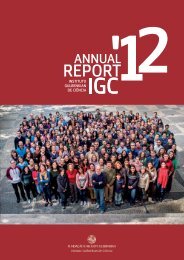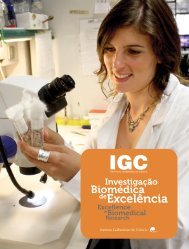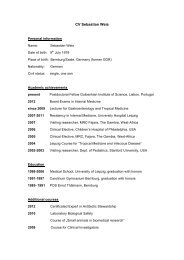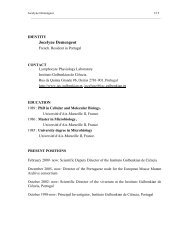organisation - the Instituto Gulbenkian de Ciência
organisation - the Instituto Gulbenkian de Ciência
organisation - the Instituto Gulbenkian de Ciência
- No tags were found...
Create successful ePaper yourself
Turn your PDF publications into a flip-book with our unique Google optimized e-Paper software.
INFLAMMATION<br />
Miguel P. Soares Principal Investigator<br />
PhD in Science, University of Louvain, Belgium, 1995<br />
Research Fellow, Harvard Medical School, Boston, MA, USA<br />
Instructor in Surgery, Harvard Medical School, Boston, MA, USA<br />
Lecturer, Harvard Medical School, Boston, MA, and USA<br />
Invited Professor at Lisbon Medical School, Universida<strong>de</strong> <strong>de</strong> Lisboa, Portugal<br />
Head of IGC Histopathology Unit<br />
Principal Investigator at <strong>the</strong> IGC since 2004<br />
Inflammation is an immediate response to foreign challenge and/or tissue injury<br />
characterised by local and transient extravasation of soluble molecules and leukocytes<br />
from blood into non-lymphoid tissues. While <strong>the</strong> physiologic purpose<br />
of inflammation is to restore homeostasis <strong>the</strong>re are many instances where inflammation<br />
becomes pathological. Moreover, <strong>the</strong>re is a general consensus that<br />
some of <strong>the</strong> major causes of human morbidity and mortality are in fact due to<br />
pathological conditions in which inflammation and/or immunity are <strong>the</strong> un<strong>de</strong>rlying<br />
cause of disease. The research effort <strong>de</strong>veloped in our laboratory is aimed<br />
at un<strong>de</strong>rstanding <strong>the</strong> cellular and molecular mechanisms assuring that in <strong>the</strong><br />
overwhelming majority of cases inflammation exerts its physiologic purpose<br />
without becoming pathological. Our body of work supports <strong>the</strong> notion that one<br />
of such mechanisms relies on <strong>the</strong> expression of cytoprotective genes that allow<br />
inflammation to progress without causing irreversible tissue damage.<br />
MODULATION OF PROGRAMMED CELL DEATH BY FREE HEME<br />
Un<strong>de</strong>r homeostasis, <strong>the</strong> reactivity of heme pros<strong>the</strong>tic groups is controlled by<br />
<strong>the</strong>ir insertion into <strong>the</strong> “heme pockets” of hemoproteins. Un<strong>de</strong>r oxidative stress<br />
however, some hemoproteins can release <strong>the</strong>ir heme pros<strong>the</strong>tic groups. The<br />
non-protein-bound (free) heme becomes highly cytotoxic, most probably due<br />
to <strong>the</strong> Fe atom contained within its protoporphyrin IX ring. When this occurs,<br />
free heme can catalyse, in an unfettered manner, <strong>the</strong> production of free radicals<br />
via Fenton chemistry and sensitise cells to un<strong>de</strong>rgo programmed cell <strong>de</strong>ath.<br />
In our laboratory we have shown that <strong>the</strong> cytotoxic effect of free heme plays<br />
an important role in <strong>the</strong> pathogenesis of a variety of inflammatory diseases in<br />
which hemoproteins release <strong>the</strong>ir pros<strong>the</strong>tic heme groups.<br />
MECHANISMS OF DISEASE TOLERANCE<br />
Malaria, <strong>the</strong> disease caused by Plasmodium infection, remains one of <strong>the</strong> main<br />
causes of morbidity/mortality worldwi<strong>de</strong>. Epi<strong>de</strong>miologically however, less than<br />
1-2% of Plasmodium-infected individuals succumb to severe forms of malaria.<br />
This suggests that Plasmodium has co-evolved with its human host to<br />
reach an evolutionary “tra<strong>de</strong> off” in which infection “rarely” compromises host<br />
viability. This tra<strong>de</strong> off is thought to rely almost exclusively on <strong>the</strong> ability of <strong>the</strong><br />
host’s immune system to control parasite bur<strong>de</strong>n, a <strong>de</strong>fence strategy referred<br />
to as resistance to infection. However, <strong>the</strong>re is an additional host <strong>de</strong>fence strategy<br />
that operates during Plasmodium infection and that limits disease severity<br />
irrespectively of parasite bur<strong>de</strong>n, i.e. tolerance to infection. The mechanisms<br />
un<strong>de</strong>rlying host tolerance to Plasmodium infection remain poorly un<strong>de</strong>rstood.<br />
We are exploring <strong>the</strong> hypo<strong>the</strong>sis that several genes that regulate <strong>the</strong> <strong>de</strong>leterious<br />
effects of free heme might control host tolerance to infection.<br />
GROUP MEMBERS<br />
Ana Ferreira (Post-doc, left in March)<br />
Josina Filipe (Post-doc, left in January)<br />
Virgínia Oliveira Marques (Post-doc, left in January)<br />
Ana Cunha (Post-doc)<br />
Rafaella Gozzelino (Post-doc)<br />
Susana Ramos (Post-doc, started in February)<br />
Rasmus Larsen (Post-doc)<br />
Zélia Gouveia (External PhD Stu<strong>de</strong>nt)<br />
Andreia Cunha (PhD stu<strong>de</strong>nt)<br />
Nadja Pejanovic (PhD stu<strong>de</strong>nt)<br />
Ivo Marguti (PhD stu<strong>de</strong>nt, left in July)<br />
Bahtiyar Yilmaz (PhD Stu<strong>de</strong>nt)<br />
Sofia Rebelo (Lab Manager)<br />
Sílvia Cardoso (Laboratory Assistant)<br />
COLLABORATORS<br />
Josef Anra<strong>the</strong>r (Cornell University, New York, USA)<br />
Leo Otterbein (Harvard Medical School, Boston, USA)<br />
Ann Smith (University of Missouri - Kansas City, USA)<br />
Ingo Bechmann (Johann Wolfgang Goe<strong>the</strong>-University, Frankfurt/Main,<br />
Germany)<br />
Yves Beuzard (Hospital Saint Louis, Paris, France)<br />
Lukas Kühn (Ecole Polytechnique Fédérale <strong>de</strong> Lausanne (EPFL), Switzerland)<br />
Carlos Penha Gonçalves (IGC, Portugal)<br />
Jocelyne Demengeot (IGC, Portugal)<br />
Henrique Silveira (<strong>Instituto</strong> <strong>de</strong> Higiene e Medicina Tropical (IHMT), Portugal)<br />
Salome Gomes (IBMC- Universida<strong>de</strong>d do Porto, Portugal)<br />
FUNDING<br />
FP6 Framework Programme 6, European Commission<br />
GEMI Fund Lin<strong>de</strong> Healthcare<br />
The Bill & Melinda Gates Foundation, USA<br />
Fundação para a Ciência e a Tecnologia (FCT), Portugal<br />
PROTECTION AGAINST MALARIA BY "NATURAL" ANTIBODIES<br />
We are testing <strong>the</strong> hypo<strong>the</strong>sis that antibodies directed against a specific carbohydrate<br />
produced by gut pathogens might play a role in immunity against<br />
severe forms of malaria. Newborns and young children, who are most susceptible<br />
to <strong>the</strong>se severe forms of <strong>the</strong> disease, have not yet built up antibodies to this<br />
carbohydrate. We will assess whe<strong>the</strong>r stimulating production of this antibody<br />
after birth can offer increased protection.<br />
REGULATION OF ADAPTIVE IMMUNITY BY HEME OXYGENASE-1 (HO-1)<br />
Over <strong>the</strong> past few years we exten<strong>de</strong>d our original studies to test <strong>the</strong> hypo<strong>the</strong>sis<br />
that HO-1 might regulate T cell mediated autoimmunity leading to <strong>the</strong> pathogenesis<br />
of immune mediated inflammatory diseases such as diabetes, arthritis<br />
or multiple sclerosis (MS). We found that this is in<strong>de</strong>ed <strong>the</strong> case for MS, where<br />
disease progression is caused by T cell driven neuroinflammation, leading to<br />
central nervous system injury. The mechanism un<strong>de</strong>rlying <strong>the</strong> protective effect<br />
of HO-1 against autoimmune neuroinflammation is not clear. We are testing <strong>the</strong><br />
IGC ANNUAL REPORT ‘11<br />
RESEARCH GROUPS<br />
60






